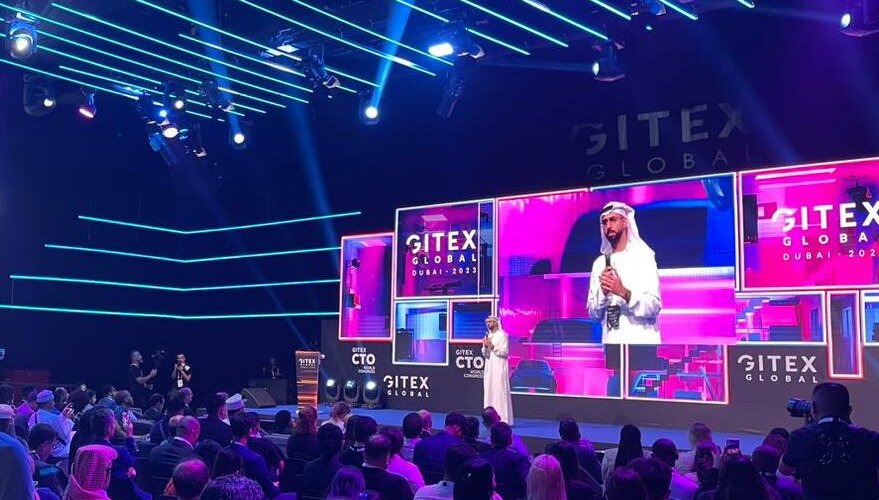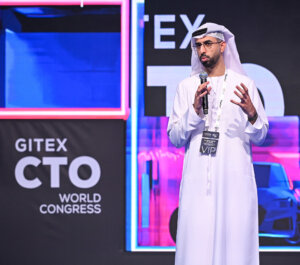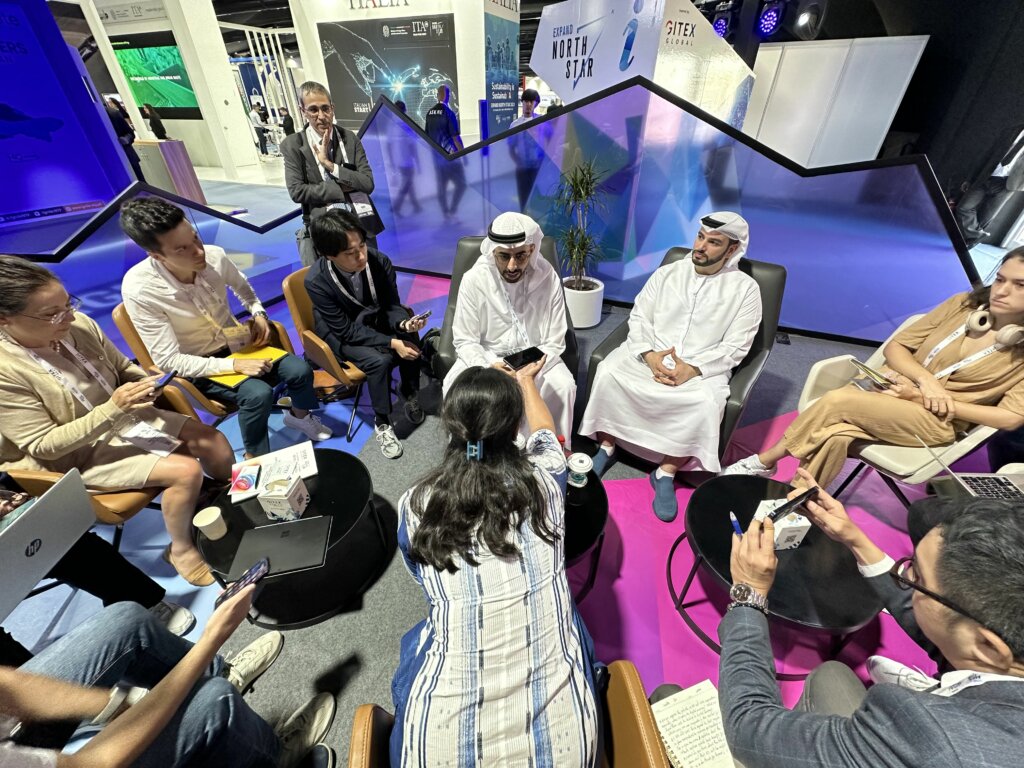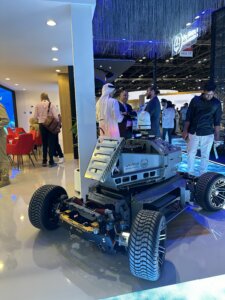
UAE Minister Al Olama believes countries need a fresh approach to governing AI.
What were the highlights of GITEX 2023?
- Digital Dubai and the DCAI teamed up to introduce the Dubai.AI platform at GITEX 2023.
- Dubai’s Roads and Transport Authority showcased smart gates with facial recognition for the city’s Metro commuters.
- UAE Minister Al Olama says countries need a fresh approach to governing AI.
“If you resist artificial intelligence, you will be finished.” That was the message of HE Omar Sultan Al Olama, the Minister of State for AI Digital Economy for the UAE government, at the opening of the GITEX 2023 CTO World Congress.
His statement resonated with the crowd at the 43rd edition of GITEX Global, the world’s largest technology and startup exhibition in Dubai, where AI’s influence on companies’ presence cannot be overlooked.
Over 6,000 companies from 180 countries and thousands of attendees flooded to the Dubai World Trade Centre (DWTC) for the five-day event which began on October 16, 2023. The United Arab Emirates’ annual technology event spans 41 exhibition halls, showcasing tech giants and startups specializing mainly in AI, cybersecurity, and mobility.
The event also expanded significantly across Dubai Harbor, where Expand North Star, a startup focus event hosted by the Dubai Chamber of Digital Economy, took place concurrently. Dubai’s vested interest in AI – the technology that has taken center stage globally this year – was apparent in both events. More than 1,000 AI-infused companies were participating, according to organizers, as concerns over governance, regulations, and job security remain.

HE Omar Sultan Al Olama, the Minister of State for AI Digital Economy for the UAE government, at the opening of the inaugural GITEX CTO World Congress 2023.
Photo: GITEX Global
“AI needs to be unleashed, rather than confined and restricted,” Al Olama told reporters on the sidelines of GITEX 2023. In sharing the view of his administration, the Minister claimed that “governments’ responsibilities around the world should revolve around increasing awareness, reducing ignorance, and ensuring that people can access AI tools.”
Al Olama believes that the world is entering an era that separates countries that embrace AI and those that don’t. “That’s going to be the key differentiator. If you embrace AI, you will try. If you don’t, unfortunately, you will remain stagnant,” he told reporters.
Governing AI the right way: A hot topic at GITEX 2023
During his keynote address, Al Olama captivated the audience by advocating a global consensus on AI governance. He stressed governing AI use cases rather than the technology itself. He called for discussions to be more solution-focused rather than dominated by fears. “I think the current global discussion on AI governance is a non-starter,” he told reporters about regulating the technology during a media briefing on day two of GITEX 2023.
Al Olama, who became the world’s first minister in the AI field in 2017, believes that governments must openly address concerns around AI. “Fear should not dominate the discussion,” he reiterated. He, however, thinks tackling the issue of deepfakes is a global problem for governments.
“I think deepfakes need to be addressed, because they erode the people’s trust in the content,” Al Olama said. “It’s a big problem, so we must be heavy-handed with deepfakes.” The Minister suggested that governments should also take a firm stance against using tools that create misinformation, as these tools too can erode trust – this time in governments.
The Minister, who was recently named by Time magazine among the 100 most influential people in AI, highlighted the remarkable journey of the UAE as an early adopter of AI. A 2019 report on the Government Artificial Intelligence Readiness Index², which examined over 190 countries worldwide to determine its rankings, has placed the UAE at the top of the Arab world for its readiness to adopt AI technologies.
By June of this year, special task forces within 30 government entities in Dubai had been formed to harness the power of AI to transform government operations and services.

UAE’s His Excellency Omar Sultan Al Olama, Minister of State for Digital Economy, Artificial Intelligence and Remote Work Applications and Chairman of Dubai Chamber of Digital EconomHis Excellency Omar Sultan Al Olama, Minister of State for Digital Economy, Artificial Intelligence and Remote Work Applications and Chairman of Dubai Chamber of Digital Economy during a media briefing at GITEX 2023.
Some of those government bodies were present at GITEX 2023, and Tech Wire Asia had the opportunity to visit their booths and peek into their AI innovations.
Digital Dubai
Digital Dubai inaugurated the Dubai Government Pavilion at the GITEX 2023, bringing together more than 40 government and private entities in the Emirate of Dubai. Director general of Digital Dubai, Hamad Obaid Al Mansoori, asserted that “the Dubai Government Pavilion at GITEX Global 2023 offers a glimpse into Dubai’s digital future, where emerging and advanced technologies play a central role in ensuring happiness among citizens and residents, offering them easy, quick, and integrated digital services.”
The Digital Dubai platform this year included 40 pavilions, each representing a government or private entity from various fields, who came together to strive for a common purpose – to position Dubai as a global digital hub and an inspiring international capital. Among the services showcased were the Dubai.AI platform, in partnership with the Dubai Center for Artificial Intelligence (DCAI). The platform allows users to quickly and seamlessly access services and information about Dubai across various sectors.
Dubai.AI was developed in partnership with government entities in the emirate. It can be populated it with accurate information and services from reliable sources, making that data available to all users.
There was also the ‘Al Maha’ project on cybersecurity, an advanced scanning tool designed to locate all government digital assets on the internet, whether they’re hosted in the UAE or abroad.
The platform can identify vulnerabilities in these digital assets, classify them by severity, and suggest the most effective methods to address them. Additionally, Digital Dubai is introducing the Application Programming Interface (API) Tester, a portal that lets users, developers, and security officers evaluate and test their API endpoints. The API scanner will identify gaps and weaknesses in the provided API requests, primarily helping developers and users to patch and secure their APIs.
Digitizing Dubai’s Metro
At Dubai’s Roads and Transport Authority (RTA) pavilion were an array of AI projects and initiatives, including a smart gate for paying public transport fares through facial recognition. The RTA plans to roll out the smart gates next year, with plans to test it out at public transport stations where there is less volume of passengers before it will be rolled out across all stations after the Proof of Concept succeeds.
تعتبر البوابة الذكية التي تتيح دفع تعرفة #المواصلات_العامة باستخدام بصمة الوجه جزءاً من خطة الهيئة الاستراتيجية للتحول الرقمي التي تهدف إلى تلبية الاحتياجات التشغيلية والارتقاء بتجربة الركاب. قم بزيارة منصة #هيئة_الطرق_و_المواصلات "S1-E" في معرض #جيتكس2023 من 16 إلى 20 أكتوبر في… pic.twitter.com/dhwp3xVKpS
— RTA (@rta_dubai) October 17, 2023
The RTA plans to adopt the same facial recognition technology in all other modes of public transportation in Dubai, including trams, buses, abra (a traditional small ferry-like boat used to ferry people across the Dubai Creek), and taxis. The RTA’s goal is to move from physical and digital cards to a facial recognition system.
The convergence of AI and Arabic
The UAE has recently made strides in AI, having unveiled two major large language models – the underlying algorithm that powers generative AI – to prove its intentions of becoming a leader in the industry. At one of the government pavilions at GITEX 2023, the LLM models, Jais and Falcon, were showcased, and according to Al Olama, they have been well received by the public.
Jais, an open-source bilingual Arabic-English LLM, was developed through collaboration between Inception, an AI company in Abu Dhabi, the G42 unit, Mohammed Bin Zayed University of Artificial Intelligence, and Silicon Valley’s Cerebras Systems. Jais is designed to make the Arabic language a prominent player in AI.
Conversely, Falcon is a flagship LLM by the UAE’s Technology Innovation Institute (TII). Falcon 180B is closely ranked just behind OpenAI’s latest GPT-4 and matches the performance level of Google’s PaLM 2 Large, the model that powers Bard, according to the company.
Driverless police patrol car

Dubai Police have revealed their intention to deploy autonomous electric patrol vehicles in the residential districts of the emirate.
Adding to the variety of Dubai’s government entities showing their AI innovations at GITEX 2023 was an autonomous Dubai Police patrol car that could handle the city’s streets. The vehicle, equipped with a drone launcher, radar detector, and surveillance camera, will provide Dubai Police with an innovative and effective method for city patrolling.
According to a spokesperson, the department has concluded its research and development phase, and the vehicle is currently in production. It will be operational on the city’s streets within the following year.
“It took 65 engineers five years of research to build the vehicle named Autonomous Police Patrol M02,” which, according to the spokesperson, can function with an accuracy rate of 99.9%.
READ MORE
- Safer Automation: How Sophic and Firmus Succeeded in Malaysia with MDEC’s Support
- Privilege granted, not gained: Intelligent authorization for enhanced infrastructure productivity
- Low-Code produces the Proof-of-Possibilities
- New Wearables Enable Staff to Work Faster and Safer
- Experts weigh in on Oracle’s departure from adland






